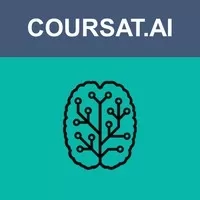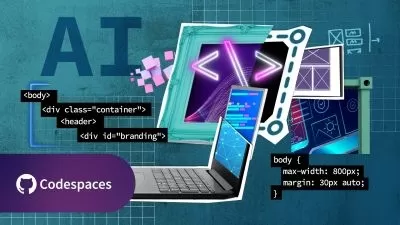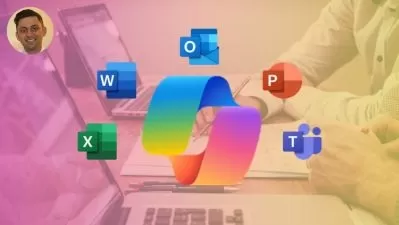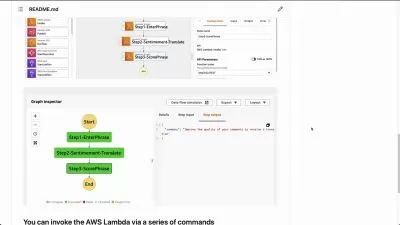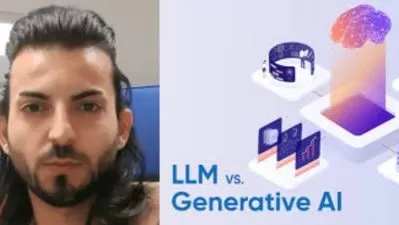Reinforcement Learning (English): Master the Art of RL
Coursat.ai Dr. Ahmad ElSallab
9:01:21
Description
Reinforcement Learning
What You'll Learn?
- Define what is Reinforcement Learning?
- Apply all what is learned using state-of-the art libraries like OpenAI Gym, StabeBaselines, Keras-RL and TensorFlow Agents
- Define what are the applications domains and success stories of RL?
- Define what are the difference between Reinforcement and Supervised Learning?
- Define the main components of an RL problem setup?
- Define what are the main ingredients of an RL agent and their taxonomy?
- Define what is Markov Reward Process (MRP) and Markov Decision Process (MDP)?
- Define the solution space of RL using MDP framework
- Solve the RL problems using planning with Dynamic Programming algorithms, like Policy Evaluation, Policy Iteration and Value Iteration
- Solve RL problems using model free algorithms like Monte-Carlo, TD learning, Q-learning and SARSA
- Differentiate On-policy and Off-policy algorithms
- Master Deep Reinforcement Learning algorithms like Deep Q-Networks (DQN), and apply them to Large Scale RL
- Master Policy Gradients algorithms and Actor-Critic (AC, A2C, A3C)
- Master advanced DRL algorithms like DDPG, TRPO and PPO
- Define what is model-based RL, and differentiate it from planning, and what are their main algorithms and applications?
Who is this for?
What You Need to Know?
More details
DescriptionHello and welcome to our course; Reinforcement Learning.
Reinforcement Learning is a very exciting and important field of Machine Learning and AI. Some call it the crown jewel of AI.
In this course, we will cover all the aspects related to Reinforcement Learning or RL. We will start by defining the RL problem, and compare it to the Supervised Learning problem, and discover the areas of applications where RL can excel. This includes the problem formulation, starting from the very basics to the advanced usage of Deep Learning, leading to the era of Deep Reinforcement Learning.
In our journey, we will cover, as usual, both the theoretical and practical aspects, where we will learn how to implement the RL algorithms and apply them to the famous problems using libraries like OpenAI Gym, Keras-RL, TensorFlow Agents or TF-Agents and Stable Baselines.
The course is divided into 6 main sections:
1- We start with an introduction to the RL problem definition, mainly comparing it to the Supervised learning problem, and discovering the application domains and the main constituents of an RL problem. We describe here the famous OpenAI Gym environments, which will be our playground when it comes to practical implementation of the algorithms that we learn about.
2- In the second part we discuss the main formulation of an RL problem as a Markov Decision Process or MDP, with simple solution to the most basic problems using Dynamic Programming.
3- After being armed with an understanding of MDP, we move on to explore the solution space of the MDP problem, and what the different solutions beyond DP, which includes model-based and model-free solutions. We will focus in this part on model-free solutions, and defer model-based solutions to the last part. In this part, we describe the Monte-Carlo and Temporal-Difference sampling based methods, including the famous and important Q-learning algorithm, and SARSA. We will describe the practical usage and implementation of Q-learning and SARSA on control tabular maze problems from OpenAI Gym environments.
4- To move beyond simple tabular problems, we will need to learn about function approximation in RL, which leads to the mainstream RL methods today using Deep Learning, or Deep Reinforcement Learning (DRL). We will describe here the breakthrough algorithm of DeepMind that solved the Atari games and AlphaGO, which is Deep Q-Networks or DQN. We also discuss how we can solve Atari games problems using DQN in practice using Keras-RL and TF-Agents.
5- In the fifth part, we move to Advanced DRL algorithms, mainly under a family called Policy based methods. We discuss here Policy Gradients, DDPG, Actor-Critic, A2C, A3C, TRPO and PPO methods. We also discuss the important Stable Baseline library to implement all those algorithms on different environments in OpenAI Gym, like Atari and others.
6- Finally, we explore the model-based family of RL methods, and importantly, differentiating model-based RL from planning, and exploring the whole spectrum of RL methods.
Hopefully, you enjoy this course, and find it useful.
Who this course is for:
- Machine Learning Researchers
- Machine Learning Engineers
- Data Scientists
Hello and welcome to our course; Reinforcement Learning.
Reinforcement Learning is a very exciting and important field of Machine Learning and AI. Some call it the crown jewel of AI.
In this course, we will cover all the aspects related to Reinforcement Learning or RL. We will start by defining the RL problem, and compare it to the Supervised Learning problem, and discover the areas of applications where RL can excel. This includes the problem formulation, starting from the very basics to the advanced usage of Deep Learning, leading to the era of Deep Reinforcement Learning.
In our journey, we will cover, as usual, both the theoretical and practical aspects, where we will learn how to implement the RL algorithms and apply them to the famous problems using libraries like OpenAI Gym, Keras-RL, TensorFlow Agents or TF-Agents and Stable Baselines.
The course is divided into 6 main sections:
1- We start with an introduction to the RL problem definition, mainly comparing it to the Supervised learning problem, and discovering the application domains and the main constituents of an RL problem. We describe here the famous OpenAI Gym environments, which will be our playground when it comes to practical implementation of the algorithms that we learn about.
2- In the second part we discuss the main formulation of an RL problem as a Markov Decision Process or MDP, with simple solution to the most basic problems using Dynamic Programming.
3- After being armed with an understanding of MDP, we move on to explore the solution space of the MDP problem, and what the different solutions beyond DP, which includes model-based and model-free solutions. We will focus in this part on model-free solutions, and defer model-based solutions to the last part. In this part, we describe the Monte-Carlo and Temporal-Difference sampling based methods, including the famous and important Q-learning algorithm, and SARSA. We will describe the practical usage and implementation of Q-learning and SARSA on control tabular maze problems from OpenAI Gym environments.
4- To move beyond simple tabular problems, we will need to learn about function approximation in RL, which leads to the mainstream RL methods today using Deep Learning, or Deep Reinforcement Learning (DRL). We will describe here the breakthrough algorithm of DeepMind that solved the Atari games and AlphaGO, which is Deep Q-Networks or DQN. We also discuss how we can solve Atari games problems using DQN in practice using Keras-RL and TF-Agents.
5- In the fifth part, we move to Advanced DRL algorithms, mainly under a family called Policy based methods. We discuss here Policy Gradients, DDPG, Actor-Critic, A2C, A3C, TRPO and PPO methods. We also discuss the important Stable Baseline library to implement all those algorithms on different environments in OpenAI Gym, like Atari and others.
6- Finally, we explore the model-based family of RL methods, and importantly, differentiating model-based RL from planning, and exploring the whole spectrum of RL methods.
Hopefully, you enjoy this course, and find it useful.
Who this course is for:
- Machine Learning Researchers
- Machine Learning Engineers
- Data Scientists
User Reviews
Rating
Coursat.ai Dr. Ahmad ElSallab
Instructor's Courses
Udemy
View courses Udemy- language english
- Training sessions 65
- duration 9:01:21
- Release Date 2023/06/23





